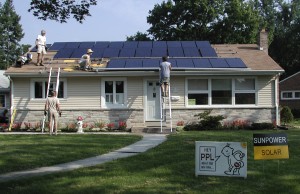Wolf’s budget proposal plus renewed private investment could give solar a boost
-
Michele W. Berger

Tami and Randy Wilson / AP Photo
In this undated photo, solar panels are installed on the Harrisburg, Pa. home of Tami and Randy Wilson.
Solar energy has taken a back seat to shale gas in Pennsylvania in recent years. But it’s getting renewed attention, thanks in part to a proposal from Governor Tom Wolf and new legislation aimed at funding the lapsed Pennsylvania Sunshine Solar, a rebate program for homeowners and small businesses. Investment from a large solar service provider could also bring more of this renewable energy, plus jobs, to southeastern Pennsylvania.
More than 33,000 Pennsylvania homes get their power from the sun, yet the state lags behind its neighbors in New York, New Jersey and Ohio, according to nonprofit The Solar Foundation. It doesn’t fare much better when it comes to jobs in this sector, offering just 2,800 compared to more than 7,000 in both New York and New Jersey.
State Rep. Greg Vitali (D-Delaware) said making this alternative energy more of a priority demands a two-fold approach: Relaunch Sunshine Solar and up the percentage of energy that companies like PECO must provide from renewable sources. “The Pennsylvania requirement is low relative to other states,” Vitali said. “Increasing our Alternative Energy Portfolio Standard would help.”
Vitali introduced House Bill 100 in February that would raise renewable energy requirements from 8 percent to 15 percent by 2023. He also authored House Bill 200, which puts $25 million a year toward Pennsylvania Sunshine Solar.
Funding for that program, which ran dry in November 2013, could come from another place, too: Wolf’s proposed $225 million bond package for alternative energy, which earmarks $50 million for it. The money could in theory result from Wolf’s severance tax proposal.
Reviving Sunshine Solar could mean much greater adoption of this energy statewide, Vitali said. “People want to put solar panels on their roofs, but if it doesn’t make sense from a dollars-and-cents perspective, that turns people away.”
SolarCity, a 10-year old renewable energy provider working in more than a dozen states, has a plan of attack.
On March 12, the company announced a new solar energy loan program, as well as plans to once again offer service in Philadelphia and its surrounds. “[People] are very attracted to solar and they generally want to use clean power but they don’t necessarily want to make a financial sacrifice,” said Jonathan Bass, a SolarCity spokesman. “If you can offer them a clean power option at a discount of the local utility rate, then they become very interested.”
Currently SolarCity doesn’t have operations in Pennsylvania, but according to Bass, the company is scoping out a physical location for a center that will have 30 positions to fill—a number that may sound low but in reality represents about one percent of the state’s solar jobs.
Despite the renewed interest in promoting solar energy, to get the money Wolf seeks for it, the Democratic governor may still have an uphill battle ahead of him. “There’s concern about why one industry would be expected to subsidize its competitors,” Kevin Sunday, government affairs manager of The Pennsylvania Chamber of Business and Industry, told the Pittsburgh Post-Gazette. Even some who support the proposal expressed concerns about depending on any industry, period, but in particular one that experiences such regular ups and down.
Vitali said even with obstacles, this can be done.
“There just needs to be some horse trading. That’s the give and take of politics,” he added. “This can be done. It involves trade-offs.”
















